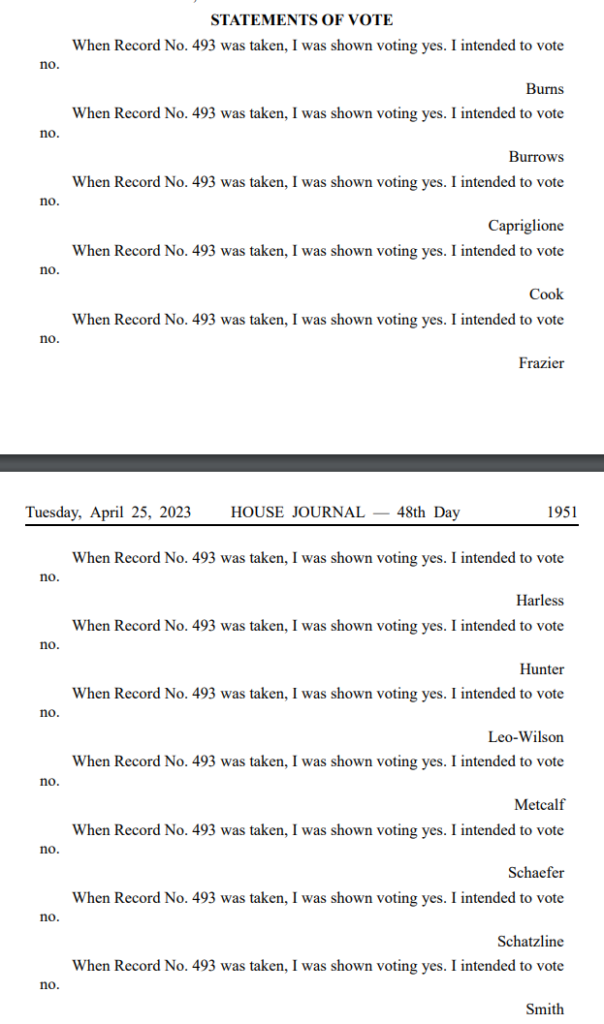
On Tuesday, the Texas House finally passed House Bill 438, legislation that Texans for Fiscal Responsibility (TFR) claimed raised the pensions of lawmakers since those pensions are tied to district judge salaries.
Many lawmakers, especially the legislation’s author, took issue with this claim. The author, State Rep. Mike Schofield (R-Katy), denied that fact in a statement from the front mic, saying, “This isn’t about lawmaker pension raises. It never was about lawmaker pension raises, regardless of what Twitter has said”. But is that true? Not really, according to our research and opinion from legal counsel.
Let’s go back to the introduction of the bill. TFR put out a vote notice on the bill and said that it raised the base salaries of district judges based on inflation. This fact alone is enough to oppose the bill since taxpayers have not been offered the same inflation adjustment when it comes to things like property tax relief (instead, many lawmakers are simply lying about how much relief is being offered, hoping voters are too ignorant to do the math). TFR has been vocal in calling out lawmakers on their fuzzy math, which they continue to lie about.
According to the way the HB 438 was written, here is the opinion of our legal counsel on the matter:
“This week legislators are considering House Bill 438, which would index judicial salaries to
inflation and presumably would increase legislators’ pensions with it. The bill was postponed on
Wednesday after taxpayers complained about the impending passage of the self-serving
legislation. Now legislators are protesting, arguing that the bill will increase judicial salaries without
impacting legislator pensions. But that does not follow from a natural reading of the laws
governing legislator pensions.
“Tex. Gov’t Code § 814.103(a) provides: ‘[T]he standard service retirement annuity for service
credited in the elected class of membership is an amount equal to the number of years of
service credit in that class, times 2.3 percent of the state base salary, excluding longevity pay
payable … and as adjusted from time to time, being paid to a district judge as set by the
General Appropriations Act in accordance with Section 659.012(a).’
“House Bill 438 would add subsections (b-2) and (b-3) to Tex. Gov’t Code § 659.012(a). Some
argue that because those sections aren’t part of (a), they would not impact the calculation of a
legislator’s pension. But this is not a natural reading of these laws, in which the proposed
modifications in (b-2) modify the calculation under (a). In other words, they are incorporated
into (a). Moreover, judicial salaries are stated in Article IV of the budget.“The calculation of judicial salaries under the proposed subsection (b-2) would undoubtedly be reflected in future budgets. Because legislator pensions are calculated based on the state base salary ‘as adjusted from time to time … as set by the General Appropriations Act’ the restating of the salaries in the budget would have the effect of adjusting the pension entitlement of legislators.”
After the notice was initially published, six House lawmakers voted against the legislation.

Those lawmakers, as seen above, were Republican State Reps. Briscoe Cain (Deer Park), Brian Harrison (Midlothian), Bryan Slaton (Royse City), Tony Tinderholt (Arlington), Steve Toth (The Woodlands), and Terry Wilson (Georgetown).
This is where the disagreements began. We were assured the bill was “clear and not confusing” and that it clearly does not raise pensions for lawmakers. The problem is that after that initial vote was taken on second reading, we saw 12 House lawmakers scramble to change their votes in the House Journal (seen below). Those lawmakers included Republican State Reps. DeWayne Burns (Cleburne), Dustin Burrows (Lubbock), Giovanni Capriglione (Southlake), David Cook (Mansfield), Frederick Frazier (McKinney), Sam Harless (Spring), Todd Hunter (Corpus Christi), Terri Leo-Wilson (Galveston), Will Metcalf (Montgomery), Matt Schaefer (Tyler), Nate Schatzline (Fort Worth), and Reggie Smith (Van Alstyne).

So, it seems as if it was not clear enough for them to keep their vote the same, and looks like there was some serious doubt on behalf of quite a few lawmakers. On top of this, when the bill came up for third reading the following day (Thursday), Schofield decided to postpone the bill until that Friday, April 28th. Again, this alleged very clear and simple bill—that totally did not raise pensions for lawmakers—was postponed for unnamed reasons.
Yet again, when HB 438 was to be considered on Friday for a third reading vote, Schofield postponed it yet again until Tuesday, May 2nd. This entire time, we heard from lawmakers about how clear it was that this legislation did not raise pensions, which begs the question: Why the delays and the vote changes? The logical conclusion is that it was not clear enough for them, and they had to buy as much time as possible to figure out an explanation.
During this time, we discovered that a separate bill, Senate Bill 1509, was considered and passed on the House’s Local and Consent Calendar; apparently, virtually none of the lawmakers were aware that it partially decoupled their pensions from that of district judge salaries. Notably, if passed and made law by the governor, this change would only affect lawmaker pensions going forward, not lawmakers who are already retired. So, if this bill is passed into law (which is likely), this would solve the problem of current legislators’ pension bumps but still gives raises to previously elected lawmakers.
Of course, none of this changes the fact that HB 438, in its current form and based on current law, bumps district judge salaries (which does, in fact, increase pensions for all lawmakers).
HB 438 came up for a third and final reading vote on Tuesday, with the author making the statement cited earlier about how the legislation clearly does not raise pensions. He of course did not offer an explanation as to why the bill was delayed twice and why a dozen lawmakers changed their second reading votes if the bill was, in fact, clear. The final vote split (seen below) is unofficial, and it remains to be seen how many journal statements will manifest in the coming days.

So, did lawmakers raise pensions based on district judge salaries? Yes, yes they did. (Hold them accountable here!)
However, a separate bill that lawmakers were completely unaware of will pass decoupling their pensions from district judge salaries, but the simple reading of the law still insinuates that the majority of the House voted to increase pensions for retired lawmakers based on inflation. I hope this article has brought some clarity to a pretty confusing subject and provided the reasons why we still maintain that lawmakers did, in fact, vote for raises to their own pensions.
Why should this be important for TFR subscribers? It shows that when you shine a light on the actions of the Legislature, many scramble to hide their actions from public view. Someone has to give taxpayers a seat at the table, and this is why TFR exists. We will continue to engage the Legislature, call out confusing bills, and report on the actions of those who claim to represent taxpayers.
Texans for Fiscal Responsibility relies on the support of private donors across the Lone Star State in order to promote fiscal responsibility and pro-taxpayer government in Texas. Please consider supporting our efforts! Thank you!
Get The Fiscal Note, our free weekly roll-up on all the current events that could impact your wallet. Subscribe today!




